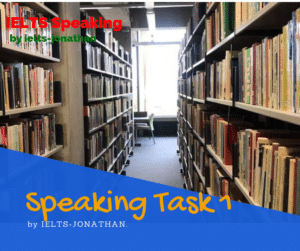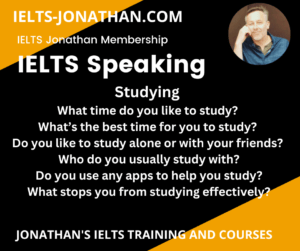The topic of Studying in Part 1 Speaking
Did you know that the first part of the IELTS Speaking test can be the most difficult for candidates.
Not only is the candidate in a test situation, but the candidate is has to deal with listening to an examiner who may speak with an unfamiliar accent or at some speed.
But don’t despair it can also be the easiest part, and the most enjoyable. 🙂

There is a valid reason for this part of the IELTS test, and I will explain this below.
One reason for IELTS Speaking Part 1 is to ease the candidate into the test, and allow the candidate to tune into the voice of the examiner.
The three sets of questions are not particularly challenging, but are varied in topic.
They allow the candidate to ‘warm up‘ and ‘gain confidence‘ and additionally give the examiner ‘a feel‘ to the candidate’s immediate level. 🙂
One way to do well in this section is to relax and let the examiner lead the converstation.
A relaxed candidate always listens better and responds well.
IELTS Speaking Tips
- Don’t give the examiner an opportunity to ask ‘why‘ or ‘why not’
- Don’t give an over-complicated or over-extended answer
- Try to connect your sentences where you can
- Attempt to use complex sentences rather than short, simply ones
- Don’t hesitate too much, you can make some mistakes
and
- Don’t be afraid to correct yourself
If you don’t understand something, always ask the examiner to repeat the question.
Studying as an IELTS Speaking Topic
Think about the questions which follow and think about the kind of answer you could give.
Aim to give an answer that lasts between 8 to 20 seconds.
What time do you like to study?
What’s the best time for you to study?
Do you like to study alone or with your friends?
Who do you usually study with?
My IELTS Speaking Advice
IELTS Part 1 features three random topics chosen by the examiner.
There is a around a minute of speaking time allowed for each section of part 1, so if you can answer the question fully AND extend it, you will get asked fewer questions!
Look at these examples and see how the candidate has said just enough to statisfy the speaking requirements.
- What time do you like to study?
Ok, so I prefer to study in the evening because the house is quieter then and I am more alert. There are also fewer distractions. In the mornings, I tend to feel a bit drowsy, especially after breakfast so it’s difficult to concentrate. There also seems to be more distractions in the morning.
- What’s the best time for you to study?
Well, I suppose the best time to study is when you have enough spare time to fit it in and also when you feel in the mood. I try to timetable my study, but it’s not always easy or possible.
- Do you like to study alone or with your friends?
I prefer to study with someone else. It is less boring than studying on your own and keeps you alert and ‘on your toes’. You can chat, and it’s a good opportunity to take a break with someone to refresh your mind. You can also help each other by concentrating on the weaker areas of your learning but you have to be careful not to waste each others time.
- Who do you usually study with?
At my school, we normally have a study period after lessons, so I sit with my best friends. In the evening I have to do private study and so I’m alone. I have to complete a lot of chores before I can ‘call it a day’, and I have to review my classwork.
I’m Jonathan
I’ve taught IELTS and University English in more than a dozen universities and schools around the world.
I’m a parent, traveller and passionate about language teaching and helping students achieve their dreams.
Whilst living in Austria or working in Asia, I run IELTS courses to help students get to where they want to be.
If you are serious about IELTS, connect with me to see how I can help you.



